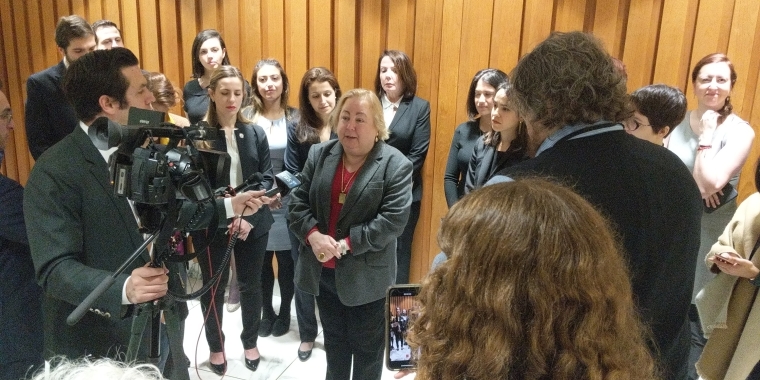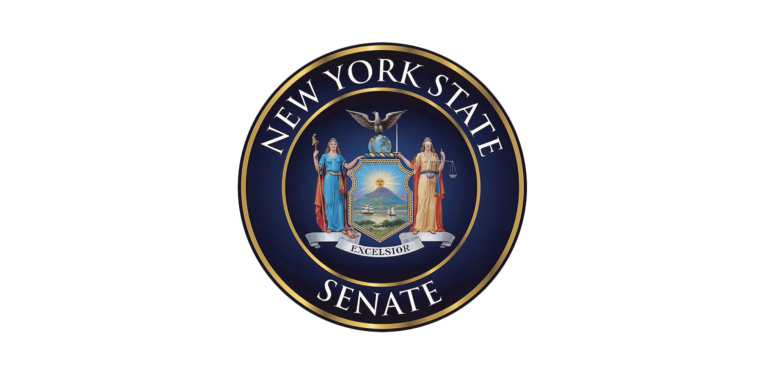
Bipartisan Group Of 67 Legislators Rebukes Ernst & Young Over Arbitration Policy
July 31, 2019

Albany – Today a bipartisan group of 67 New York State Legislators, led by Senators Liz Krueger and Alessandra Biaggi, and Assemblymembers Aravella Simotas and Jo Anne Simon, released a letter to Ernst & Young Chairman and CEO Carmine Di Sibio, rebuking the firm for its policy of forced arbitration for harassment and discrimination claims. The letter was motivated by the experience of Karen Ward, a former EY partner, who has been forced into arbitration over her claim to the US Equal Employment Opportunity Commission (EEOC) that she was fired for speaking out against ongoing sexual and gender-based harassment and discrimination at the firm. The letter can be viewed here, and is reprinted below.
"For all the progress women have made to achieve equality in the workplace, some companies still have not gotten the memo that the days of the boys' club are over," said Senator Krueger. "It is 2019, not 1959, and it is simply unacceptable to perpetuate a culture of harassment and discrimination at work. Ernst & Young claims to be a leader on gender equity, yet their forced arbitration requirements effectively slam shut the doors on their employees' access to justice. They can and must do better."
In September, 2018, Ms. Ward filed a charge with the EEOC alleging sexual harassment and gender discrimination at Ernst & Young. After filing the charge, she publicly requested that then-EY CEO Mark Weinberger release her from a contractual requirement to use arbitration to resolve the claim. Since the time the contract was signed, New York State has passed legislation to ban the future use of such forced arbitration agreements in cases of harassment and discrimination.
"Sexual harassment and discrimination in the workplace often derive from an abuse of power, and a forced arbitration agreement is a continuation of that abuse," said Senator Biaggi. "It is unacceptable to put a $100,000 price tag on justice for an employee seeking accountability for the harm they have endured. This year we passed S6577/A8421 which will eliminate arbitration agreements for cases of sexual harassment and discrimination to stop employers like Ernst & Young from silencing victims for speaking up. I commend Ms. Ward for coming forward, and demand that Ernst & Young eliminate this predatory policy immediately and start practicing the values they preach."
In addition to continuing to require arbitration, EY has refused to pay the costs of the arbitration, and the arbitrators have ordered the parties to split the cost, leaving Ms. Ward with a $185,000 bill merely to begin the process of hearing her claim, above and beyond any costs she may incur retaining her own lawyers. With the case still in the discovery phase, she will likely have to pay well over $200,000 to complete the process. By comparison, had she been permitted to file in court, she would only have had to pay a $450 fee.
Ms. Ward has filed a declaratory judgment action in federal court seeking to invalidate the arbitration agreement, claiming that no victim of sexual harassment or discrimination should be required to pay hundreds of thousands of dollars to have their claims heard.
“The case of Karen Ward is a prime example of the evils of forced arbitration agreements and the imbalanced power dynamic within this dispute resolution system," said Assemblymember Simotas. "Ernst & Young’s policy is an oppressive relic used to put up barriers and prevent targets of harassment from coming forward. This case highlights just how much workers, across all industries, need protections against mandatory arbitration clauses for discrimination claims. These clauses should not be allowed to silence workers and keep discrimination and sexual harassment tucked away in the closet. I applaud Ms. Ward for pursuing justice and I urge Ernst & Young to do the right thing and allow her to have her sexual harassment and gender discrimination claims heard in court."
“Forced arbitration in employment cases is problematic and in cases of harassment and discrimination is unacceptable, because it serves as a barrier to accessing the protections of the law, by heaping unnecessary costs on victims of discrimination and harassment, and generally limiting workers’ ability to get a fair hearing,” said Assemblymember Simon. “I’m pleased to stand with my colleagues in the Assembly and State Senate to urge Ernst & Young to reconsider its reliance on forced arbitration in cases of gender based discrimination and harassment in the case of Karen Ward and all of its employees.”
In the letter, legislators take EY to task for requiring Ms. Ward to participate in exorbitantly expensive arbitration, saying "you are effectively silencing her and sending a message to your other employees that their claims will not be given a fair hearing." Additionally, they charge that EY is failing to live up to the goals of its own "Women. Fast Forward" program, saying "it is time for Ernst & Young to move beyond lip service and make the systemic changes necessary to truly be a leader in addressing inequality in the workplace."
###
July 30, 2019
Carmine Di Sibio
Chairman and CEO
Ernst & Young- EY
Five Times Square
New York NY 10036
Dear Chairman Di Sibio,
We write to express our disappointment with the efforts by Ernst & Young to deny your former partner, Karen Ward, a reasonable opportunity to have her claims of sexual harassment and gender discrimination heard in a court of law. By limiting her recourse to forced arbitration at a personal cost of hundreds of thousands of dollars, you are effectively silencing her and sending a message to your other employees that their claims will not be given a fair hearing and that they will have to pay exorbitant costs to simply have their claims heard. This case is a particularly egregious example of the abuses that led New York State to pass legislation banning such forced arbitration agreements in cases of harassment and discrimination in the first place.
New York State is not alone in rejecting forced arbitration in cases of harassment. The private sector has also recognized that these requirements are vestiges of a past where sexual misconduct in the workplace was tolerated or ignored. Companies such as Microsoft, Uber, Google, Facebook, Lyft, Slack, Airbnb, Skadden, Arps, Slate, Meagher & Flom LLP, Sidley Austin, Kirkland & Ellis, and Orrick, Herrington & Sutcliffe LLP have voluntarily dropped mandatory arbitration requirements. It is disturbing that Ernst & Young is unwilling to recognize the negative impact arbitration requirements have on the ability of workers to get a fair hearing and the chilling effect these agreements can have on reporting.
While the problems with forced arbitration are clear, the facts in this case are even more troubling. Ernst & Young has insisted that Ms. Ward pay half the costs of arbitration, which have already added up to $185,000 with the case still in the discovery phase. If she had been permitted to file in court, she would have only had to pay $450 in court costs to have her case heard. It is obvious to us that requiring claimants to pay such exorbitant costs is a major obstacle to justice for victims of harassment.
Ernst & Young ostensibly created the “Women. Fast Forward” program to “highlight [y]our own commitment to the advancement of women in the workplace” and to “offer leadership and guidance as [you] call upon others to put gender on their agenda.” However, Ernst & Young cannot be a leader on gender equality while it is so far behind the curve in addressing workplace harassment and continues to place barriers in the way of victims who are merely seeking a fair chance at justice.
We urge Ernst & Young to reconsider its outdated approach to addressing gender inequity and show that it is committed to providing all employees with a harassment-free workplace by ensuring they have access to our justice system to address discrimination claims. Ernst & Young’s current policy of outrageously expensive, binding arbitration imposes impossible burdens on those who seek relief. It is time for Ernst & Young to move beyond lip service and make the systemic changes necessary to truly be a leader in addressing inequality in the workplace.
Sincerely,
NYS Senators
Liz Krueger
Alessandra Biaggi
John E. Brooks
James Gaughran
Andrew Gounardes
Brad Hoylman
John Liu
Rachel May
Shelley B. Mayer
Jen Metzger
Zellnor Myrie
Kevin Parker
Jessica Ramos
Gustavo Rivera
James Sanders, Jr.
Jose Serrano
James Skoufis
Kevin Thomas
NYS Assemblymembers
Aravella Simotas
Jo Anne Simon
Didi Barrett
Michael A. Blake
Patrick B. Burke
Marcos Crespo
Catalina Cruz
Steven Cymbrowitz
Martiza Davila
Carmen De La Rosa
Michael DenDekker
Eric Martin Dilan
Jeffrey Dinowitz
Steve Englebright
Harvey Epstein
Pat Fahey
Nathalia Fernandez
Mathylde Frontus
Sandy Galef
Joseph M. Giglio
Deborah J. Glick
Judy Griffin
Jonathan G. Jacobson
Charles D. Lavine
Joseph R. Lentol
Barbara S. Lifton
Angelo J. Morinello
Walter T. Mosley
Catherine Nolan
Felix W. Ortiz
Steven Otis
Anthony Palumbo
Amy R. Paulin
N. Nick Perry
Victor Pichardo
Dan Quart
Edward Ra
Philip Ramos
Karina Reyes
Linda Rosenthal
Mily Rozic
Nader J. Sayegh
Rebecca A. Seawright
Phillip G. Steck
Albert Stirpe
Chris Tague
David I. Weprin
Carrie Woerner
Tremaine Wright
Share this Article or Press Release
Newsroom
Go to Newsroom
The Impact of Casinos on Urban Communities
February 23, 2024

An Open Letter From Jewish Elected Officials Regarding The War In Gaza
February 20, 2024

